The True Meaning of Whiplash
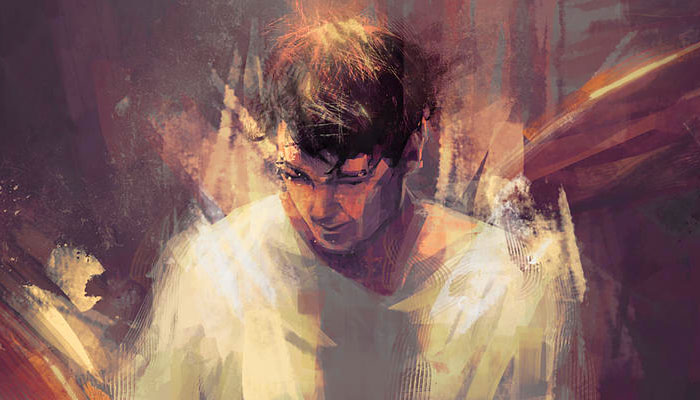
When Damien Chazelle’s directorial debut, Whiplash, first came out in 2014, it was met with overwhelming critical and commercial acclaim. Like the 2010 Darren Aronofsky classic Black Swan before it, Whiplash delves into the psyche of an obsessed artist and the lengths to which he will go to prove himself. 1 The plot itself is straightforward, following the adventures of a young music student named Andrew Nehman and his relationship with his abusive conductor-mentor Terence Fletcher, and eventually culminating in a quite-literally show-stopping finale at a music competition. The film is often understood, at least by creatives, as a psychological horror that exposes the demanding nature of the creative industry and the immense pressure artists are under. 2 The pressurized and emotionally-draining life of a professional artist is fairly old news by now, but Chazelle wisely shifts the focus slightly, posing the question of what motivates such a creative in the first place. As a review of the film from the Sundance festival points out: “[T]he film is ultimately about a rivalry not between Andrew and his instructor, but between the promising teenage drummer and himself.” 3 In other words, the main focus of Whiplash is on the type of person who would choose such a life, and, once he commits to it, how he copes with the hardship it entails.
Introducing Andrew Nehman
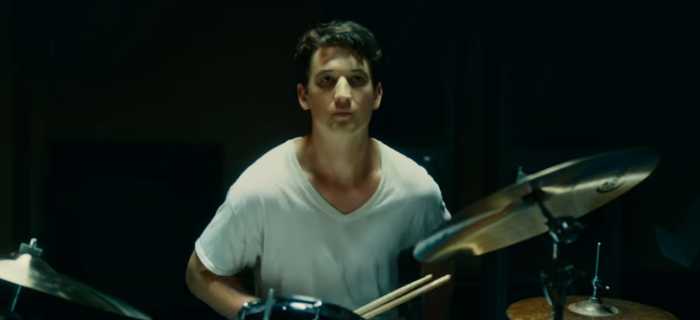
Andrew Nehman, the main protagonist of the film, is a nineteen-year-old college freshman, studying the drums at the prestigious Shaffer Conservatory in New York City. He has been playing the drums since he was approximately six years old, and his great ambition is to be the best jazz drummer the world has ever seen. To that end, he courts the favor of Terence Fletcher, who is supposedly the conductor of the most prestigious band at Shaffer. Unfortunately for him, Fletcher turns out to be a cruel tyrant, whose favorite pastimes include torturing and abusing his students.
It would be easy to draw comparisons between Nehman and the average victim of a boss from hell (one Redditor asked if it was fair to compare Whiplash to The Devil Wears Prada), 4 but this misses the point. Nehman is not a wide-eyed innocent drawn into a world of corruption and scandal, but rather a dark, brooding character right from the very start. From the moment of his introduction he is portrayed as a lonely outcast with few if any friends other than his single father. He dislikes most of the other members of his band class, and the feeling appears to be mutual, as his classmates can be heard gossiping about him behind his back. He almost never smiles, and his default attitude is one of stoic detachment.
Moreover, Nehman has several scars on both sides of his face, as well as a few on his neck and chin. These scars are real–actor Miles Teller acquired them in a car accident years prior to filming 5–but in-universe, they raise questions about what traumas might lurk in Nehman’s past. On a more basic level, the scars also make the narrow-faced, soft-voiced, ambiguously-Jewish Nehman look more rugged and rough-around-the-edges than he would otherwise be, further enhancing his image as a somewhat tragic anti-hero.
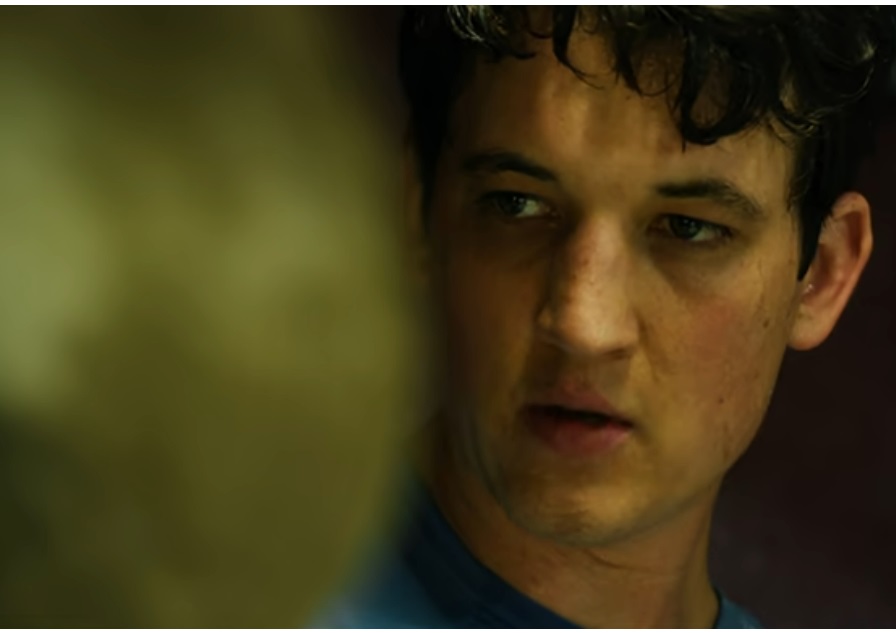
What’s in a Name?
It’s easy to miss, but both Nehman and Fletcher have meaningful names. Nehman’s last name, in particular, is played with in a very interesting way. When Nehman introduces himself, he calls himself “Andrew NAY-man;” Fletcher, for his part, willfully ignores this and instead insists on calling him “NEE-man,” which sounds like “niemand,” the German word for “nobody.” 6 The name “Nehman” is a corruption of the German “Neumann,” which literally translates to “new man,” and was historically used to refer to a stranger or newcomer. 7 This is appropriate, since Nehman is both a newcomer to Fletcher’s band, and deeply isolated and lonely.
Nehman’s given name, Andrew, is equally sly. This name, which comes from the New Testament of the Bible, translates to “strong” or “manly.” 8 Thus, Nehman’s full name can be translated as “the manly stranger,” or “the manly newcomer.” Fittingly, part of the point of Whiplash appears to be critiquing gender roles, and specifically the role that a real man should aspire to. Like the macho action heroes of old, Nehman places honor ahead of reason, shrugs off physical and mental agony, and is obsessed with pushing his own limits as far as possible in the pursuit of his goals.
Curiously, Fletcher’s own given name, Terence, actually means “soft” or “smooth.” 9 The notion that the loud-mouthed, misogynistic, bullying Fletcher could be the “soft” man, and the soft-spoken and vaguely depressed Nehman the “strong, manly” man, might at first seem absurd, but later developments in the film leave little doubt that this is the case. The fact that most people expect a “real man” to act more like Fletcher than Nehman is a testament to just how narrow and restrictive the popular view of manhood–which Fletcher is in thrall to–is. Because Fletcher takes the loud, obnoxious, alpha-male view of manhood for granted, he completely misses Nehman’s strength, resilience, and grit, which in turn causes him to underestimate his young charge over and over again.
Nehman and His Drums
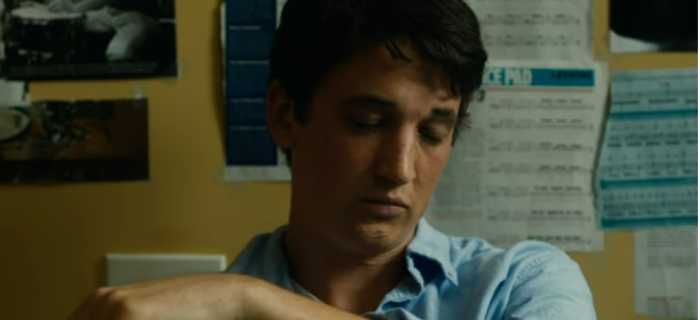
For most of the film, Nehman’s life revolves around playing his drums. This may seem understandable, given that he is in fact a drum student; but Nehman takes it to an extreme. The film opens with Nehman drumming in the recital room late at night. He’s interrupted by Fletcher, who briefly pops his head in and compares Nehman to “a wind-up monkey” before strutting out of the room.
This insult turns out to be a fairly accurate summary of Nehman’s abilities. At various points in the film Nehman is shown playing famous jazz melodies, notably “Caravan” and the eponymous “Whiplash,” which he knows by heart on account of listening to them obsessively in his spare time. Yet, it’s telling that he is never shown playing anything else. He doesn’t write his own music or even improvise much until the very end of the film. He also plays exclusively jazz, despite having an attitude and demeanor that would fit right in with a group of heavy metal, punk, or grunge rockers. He is, in effect, a very talented mimic, rather than a musician in the truest sense of the term.
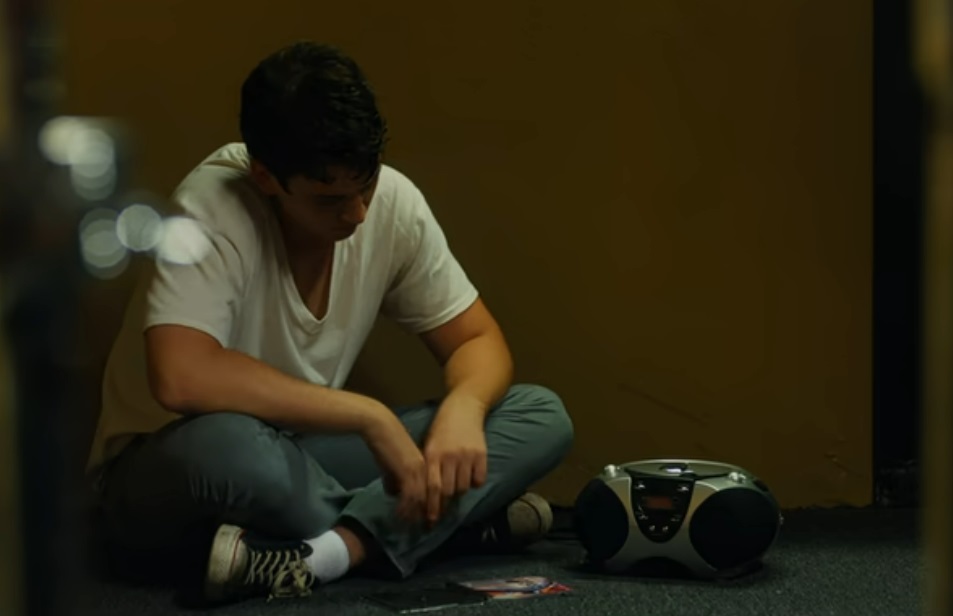
Even more disturbingly, Nehman never seems to get any enjoyment out of playing the drums. Drumming is typically thought of as a healthy and wholesome activity that combines music-making with a full-body workout. 10 Yet, Nehman makes it look like grueling effort; more often than not his face is contorted into a grimace as he plays. The clearest indication of how Nehman really feels about his music comes at a family dinner, when one of Nehman’s cousins states that he doesn’t understand the point of music competitions because “Isn’t [music] subjective?” Nehman’s response–a flat “no”–further suggests that he isn’t playing for the love of music. It often seems like, rather than playing to feel good, he’s playing because it stops him from feeling bad.
In other words, Nehman’s drumming is a behavioral addiction, much as if he were addicted to his job, exercise, or sex. His drums are an emotional crutch; astute viewers will notice that he works most feverishly at his drums when he experiences the greatest emotional pain, such as when Fletcher sabotages him or his girlfriend breaks up with him. Fletcher, of course, constantly claims that Nehman should practice more and become more perfect; but Nehman needs no such encouragement. It is not Fletcher who tells Nehman that he must practice until his hands bleed; Nehman does that to himself. Moreover, when Nehman gets into a car accident before a competition and shows up on stage bloodied and injured, Fletcher is so astonished that he cuts Nehman from the band. Nehman, who by now has been pushed to his physical and mental limits, responds by attacking him, which causes him to withdraw from Shaffer altogether.
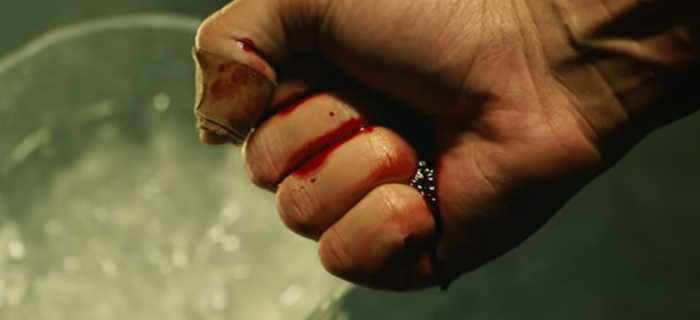
Nehman’s drumming obsession functions similarly to an addiction in other ways as well. It starts to take a toll on his body, as the more Nehman plays the more injuries he gets on his hands. He starts by covering them with bandages, and when this proves insufficient he takes to dunking his blood-covered hands in ice water. The image of a blood-spattered drum kit is also a recurring motif throughout the film. After one particularly grueling late-night practice, in which Nehman’s hands end up bleeding all over the studio drums, Nehman can be seen walking home in the moonlight with dark circles under his eyes, looking like someone who just took drugs. When Fletcher coaxes him back into the world of drumming after a long hiatus, he can be seen wearing a T-shirt with a hole in it and calling his ex-girlfriend on a cell phone he holds in bloody, bandaged fingers, suggesting that he is once again neglecting his physical needs and hurting himself in order to play more and more.
Nehman, for his part, is all too aware of how obsessed he is. At the start of the film, when Fletcher walks in on him drumming, Nehman stops drumming at once and frantically starts apologizing, as though he knows he’s doing something he shouldn’t be. When he’s explaining to his girlfriend why they can’t be together, he tells her “[E]ven when I do spend time with you I’m gonna be thinking about drumming. […] And really I’m just gonna start resenting you for even asking me to stop drumming.” Once again, he sounds like a drug addict, neglecting his relationships in pursuit of his next fix. Thus, he has enough self-awareness to recognize what he’s doing as a compulsion. It’s telling as well that, when he finally leaves music school, he not only puts away his drums but also throws away all of the jazz paraphernalia he’d been using to decorate his dorm room. At this point in time, he appears to have a genuine desire to start fresh.
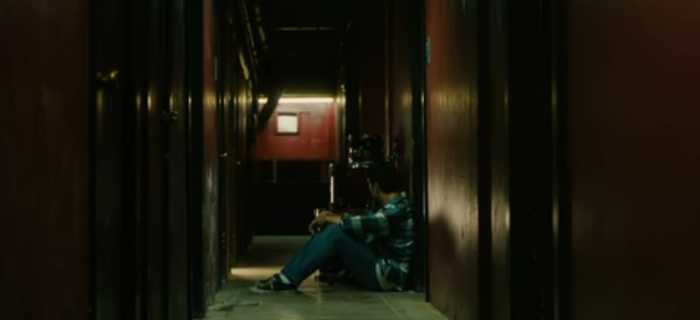
It doesn’t last, of course, because Nehman never does get around to addressing the root cause of his problems. The renowned Canadian physician Gabor Mate describes addiction as an attempt to solve a problem or cope with a trauma from one’s past. In this worldview, it is impossible to do anything about an addiction without first addressing the initial trauma. 11 Unfortunately, to face his problems head-on, and accept help for dealing with them, would require Nehman to be vulnerable, which he is both unwilling and unable to do. His father cannot help him, because he is dealing with his own problems; and the rest of his family and acquaintances don’t even try. Instead they just compound the problem by comparing Neiman unfavorably to themselves or chastising him for a lack of perspective that isn’t entirely his fault.
Thus, in a way, it is perhaps just as well that Nehman meets Fletcher. Fletcher’s cruelty forces Nehman to contend with the impossible situation that his drumming mania has gotten him into. More importantly, because Fletcher presents Nehman with an external foe to struggle against, Nehman is effectively excused from reckoning with his own inner demons. For someone as macho and stoic as Nehman, it is actually easier to bear seemingly endless amounts of abuse from a Terence Fletcher than to face his deepest fears and vulnerabilities, even for his own good.
Where it All Began

Surprisingly, the film explains exactly where Nehman got his emotional wounds, in a blink-and-miss moment early on. When Fletcher asks Nehman about his family, Nehman reveals that he has no mother, nor indeed any memory of his mother. This may seem like a trivial detail, but is actually immensely important. In The Primal Wound, a seminal book from the 1990’s detailing the experiences of adoptees, the author argues that those who are separated from their mothers at young-enough ages will develop a predictable constellation of mental and behavioral problems that she calls a “primal wound.” Some of these problems include difficulties trusting and relating to others, especially females; a fear of rejection in every relationship; and a belief that one is a bad person for having been abandoned by someone so important. Many such individuals also gravitate toward unhealthy relationships and friend groups, because they feel it is what they deserve. 12 An article profiling a man who grew up without a mother further goes on to state that such men often crave female attention but don’t trust women, which can lead them to run away from or sabotage their romantic relationships. 13
As it happens, Nehman’s behavior lines up almost perfectly with that of someone deprived of maternal love and care. He’s insecure, has low self-esteem, and often fails to regulate his emotions, swinging between stoicism, despondency, and explosive rage with little in between. He struggles to make friends his own age and seems to be on the outside looking in for every single social interaction, apart from those involving Fletcher and his father. He also has clear difficulties relating to women. He asks out a pretty girl who works at the movie theatre he frequents, but ultimately pushes her away before the relationship has a chance to get serious. What’s even more interesting is that his rationale for why they can’t be together is so detailed and well-thought-out that it suggests this kind of thing has happened before, possibly many times.
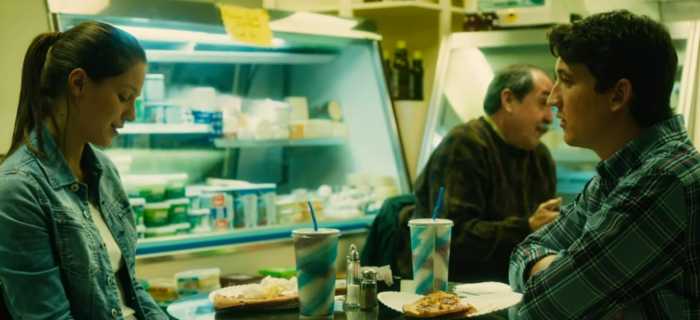
The film itself never directly explains what happened to Nehman’s mother. Nehman vaguely tells Fletcher that “she left when I was a baby,” which has all the makings of a prepared sound byte. This doesn’t stop Fletcher from running with it anyway, conjuring up elaborate scenarios in which she jilted Nehman’s father upon realizing what a failure he was, even though it’s highly unlikely that any mother would simply abandon her husband and infant son with no explanation no matter the circumstances.
A more probable explanation is that Nehman’s mother simply died giving birth to him. If this is true, it goes a long way towards explaining not only Nehman’s behavior, but his disagreements with his father. Though there is a lot of love between Nehman and his father, there is relatively little understanding, because the two see the world very differently. His father is not a cold or closed-off man; the fact that he is able to work as a high-school teacher and a writer suggests he has above-average emotional intelligence. The problem is that, according to many adoptees who have themselves lost mothers in childbirth, nobody who has not gone through such a situation could possibly imagine how it feels. 14
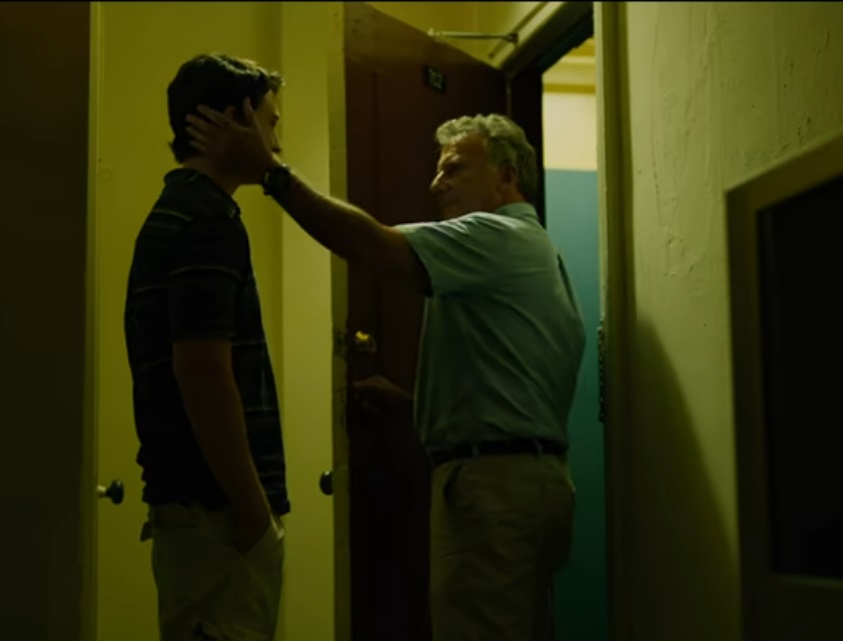
Thus, from his father’s perspective, Nehman is a precious treasure, the last remnant of his lost love that he still has left. It’s clear that he would do anything to protect Nehman, and when he tells Nehman at a particularly dark time that “there is nothing in the world more important to me than you,” it rings with sincerity and genuine pathos. To the extent that Nehman’s father envisions a future for his son at all, he presumably hopes for a long, happy life, complete with a wife and family, and a peaceful death in bed surrounded by children and grandchildren.
On the other hand, Nehman himself sees things very differently. He is desperate to prove that he deserves to exist, that the world is a better place with him in it than it would have been if he had never been born. This is why he’s so obsessed with not only being a good jazz drummer, but the world’s best jazz drummer. What looks like arrogance is in fact a misguided attempt to honor his mother’s memory, to establish that the sacrifice she made for him was, if not a net positive, at least an even trade. Since all young children are programmed by nature to idealize their mothers, and since Nehman has never had any experiences with his mother that might disillusion him, he believes that the only way to show himself as her equal is to be the best at whatever he tries to do, not just for his lifetime but for all of time. He also has no problem sacrificing his physical and mental well-being if that’s what it takes, because he cannot possibly sacrifice more than his mother already has.
Nehman himself acknowledges this in a quite interesting way during dinner with his extended family, when he tells his father that “I’d rather die drunk, broke at thirty-four and have people at the dinner table talk about me than live to be rich and sober at ninety, and nobody remember who I was.” It’s telling that Nehman’s statement contains no mention of jazz, drumming, or even music. This is because becoming a jazz drummer isn’t Nehman’s true wish. His true wish is to justify his existence by any means necessary. Nehman plays jazz because he likes and is good at it, but in the grand scheme of things it doesn’t matter to him if he’s a great jazz musician or something else entirely, as long as he is leaving his mark on the world. Paradoxically, though Nehman’s obsession with greatness is what leads him to Fletcher in the first place, it also makes him more resistant to Fletcher’s demands than any of Fletcher’s more “normal” students, since he is ultimately his own worst critic.
Fletcher and Nehman’s relationship
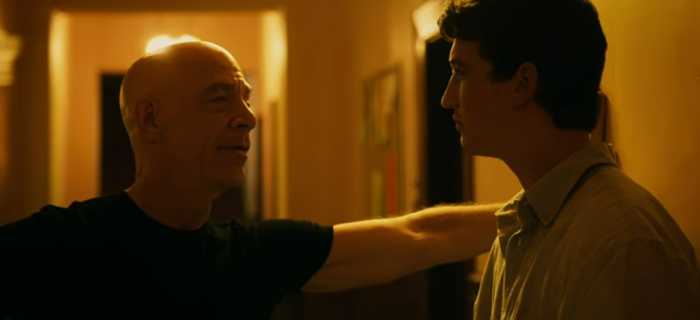
Terence Fletcher is every creative’s worst nightmare: a sadistic taskmaster who torments his mentees until their mind and spirit are broken, all while hiding behind the extremely thin excuse that he’s trying to motivate them to be better at their craft. He gets away with it, at least at first, because he is supposedly conducting the most prestigious band at Shaffer, and he often boasts of his ability to get his band members posts in Lincoln Center and other famous New York institutions. However, the only person he describes as having actually achieved such a feat is his former student Sean Casey, whom he claims has since died in a car crash. It’s later revealed that Casey died from suicide owing to the pressure that Fletcher put him under, which calls into question the rest of Fletcher’s story as well.
The implication is that Fletcher actually possesses very little skill at either music or conducting. He’s only shown playing music in one scene, when Nehman watches him play piano at a bar. In his more positive moments, Fletcher compares Nehman to the famous musician Buddy Rich, but crucially, Fletcher never professes to be the next Buddy Rich–only to be looking for the next Buddy Rich. Moreover, in most of the scenes where he conducts, he seems to be either going through the motions or actively interfering with his band members’ playing. He is often shown teasing his charges–college students young enough to be his children–until they cry.
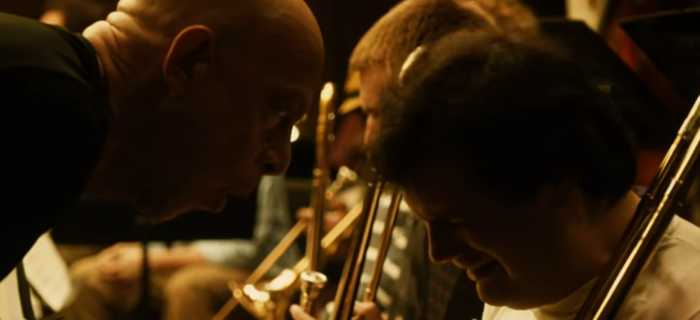
Although Fletcher never admits it openly–and may not be consciously aware of it himself–his real motive is the exact opposite of what he professes it to be. Rather than developing the next Buddy Rich or Charlie Parker, he devotes his time and energy to recruiting students who are already good at music in order to make himself look good, and then starts tearing them down the second they show any signs of being better than him. He is vaguely aware that he has missed his own chance to be a great musician himself, or possibly never had what it took to begin with, and if he can’t be great, he believes that nobody else should either.
Of course, Fletcher also seems to enjoy tormenting people for his own amusement. This is likely what attracted him to Nehman in the first place. When he first finds out about Nehman’s slavish devotion to the drums and sad home life, he assumes he’ll be easy prey, a Voodoo doll that he can tear to pieces at his leisure. This rapidly proves to be wishful thinking, however. When put under pressure, the initially shy and submissive Nehman turns out to possess a spine and will made of stainless steel. Everyone else in the band is terrified of Fletcher, but Nehman refuses to be cowed. He looks Fletcher straight in the eye as he’s being slapped, contradicts Fletcher even as he screams in his face, talks back to Fletcher when he’s upset, and at one point he gets so angry at Fletcher that the alternate drummers have to restrain him from beating Fletcher up!
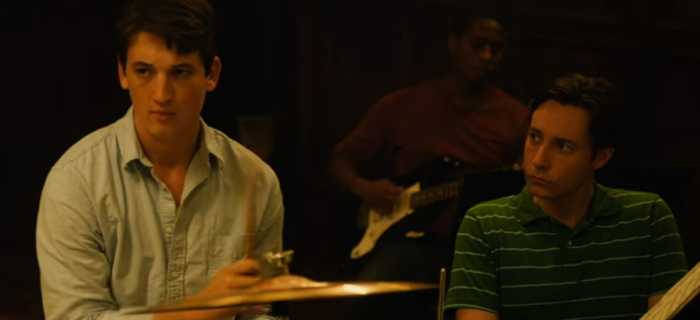
Fletcher attempts to isolate Nehman and deprive him of allies and reality checks by playing his bandmates against him. For instance, when Tanner, Fletcher’s initial core drummer, entrusts his music folder to Nehman, Fletcher steals it from under Nehman’s nose, then blames Tanner for its absence and adds insult to injury by promoting Nehman to core drummer. When Nehman takes this in stride, Fletcher begins sabotaging him directly, making the whole band suffer in the process. Most memorably, during rehearsal one evening, he has Nehman and two other drummers compete with each other to see who can best match Fletcher’s tempo. This competition ends up lasting until nearly two o’clock in the morning, bringing practice grinding to a halt and forcing all the musicians–not just the drummers–to stay up and play long past their bedtime. Towards the end of the competition, he can be shown actively trying to distract Nehman by screaming and throwing things at him, to no avail. Despite telling Nehman that he “earned [his] part,” Fletcher tries to take it away from him yet again the next day when he arrives to a competition late through no fault of his own.
When Fletcher finally cuts Nehman from the band, Nehman and his father collude with a lawyer to get Fletcher removed from his post at Shaffer, citing his abusive nature. Fletcher retaliates by inviting Nehman to play for him again, only to set him up to fail by forcing his band to play a tune Nehman has never learned in front of a live audience. Since the drummer’s main purpose in a band is to keep everyone on-rhythm, 15 Fletcher ruins the performance of all of his players, not just Nehman himself, purely out of spite! Yet, even this is not enough to push Nehman out of his life. Nehman at this point is all too aware that his music career is finished, but rather than going away quietly, he resolves to take Fletcher down with him. By the end of things, Fletcher’s determination to take out this one student has cost him everything: his job, his reputation, and (arguably) his mind.
The Most Satisfying Downer Ending
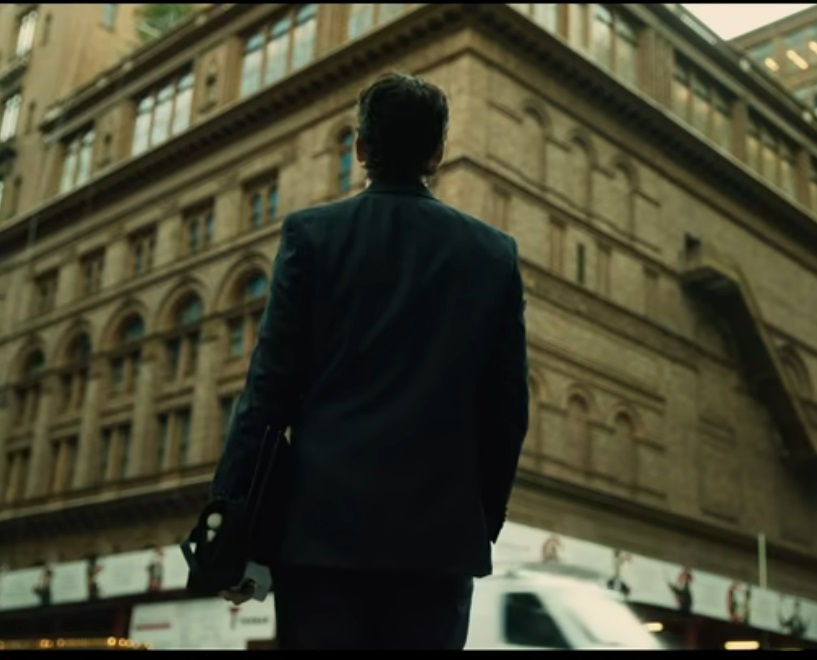
Over the summer, while Nehman is on hiatus from his drumming, he runs into Fletcher at a piano bar. Fletcher reveals that he has lost his job at Shaffer over the allegations he drove a student to suicide, but, nevertheless, has assembled a new band and will be taking them to a high-profile competition at Lincoln Center. He also hints that he might be willing to take Nehman back for the competition, owing to his supposed skill at playing many jazz classics. Nehman agrees, and shows up at the competition with his drum kit, thus precipitating the most exhilarating part of the whole film.
When Nehman arrives on stage, he expects to play his old favorites, including “Caravan” and “Whiplash.” However, instead, Fletcher opens with a song called “Upswingin’,” which Nehman has never heard before and lacks the music to. To make matters worse, Fletcher reveals to him that he knew all along that Nehman was the one who revealed the truth about Sean Casey, thereby costing him his job at Shaffer. Nehman realizes that Fletcher’s interest in taking him back was feigned, and that he is in fact hoping to torpedo Nehman’s career once and for all. The song is predictably a disaster, and when it’s over the audience can be heard clapping more out of politeness than anything else. A distraught Nehman leaves the stage and meets with his father, who has come to take him home, and the two exchange a long, meaningful hug.
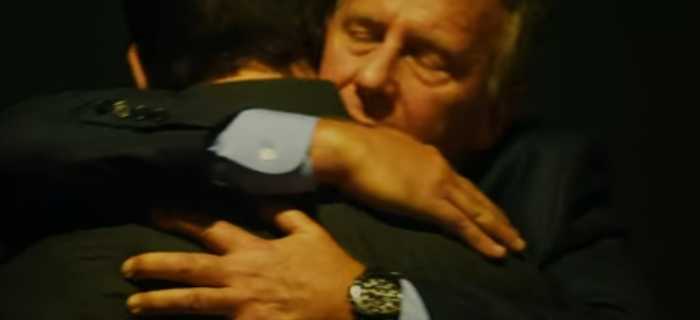
However, rather than go home with his father, Nehman instead returns to the stage. Determined not to allow Fletcher to have the last laugh, he gets back on the drums and strikes up the rest of the band in a rendition of “Caravan.” Fletcher is initially furious, but soon gets caught up in the moment and resumes his conducting with a smile on his face. By then, however, it is too late: the audience can see perfectly well that it is Nehman, not Fletcher, who has control of the band. Nehman thus shows Fletcher for the incompetent the audience always knew he was–even a mere college kid can conduct a band better than Fletcher can!
Sadly, Nehman’s triumph comes at the cost of his own life. After the song ends, he continues to play, with an initially bewildered Fletcher directing him to play harder and harder, for longer and longer. Eventually every last inch of Nehman’s face, clothes, and drum kit is drenched with sweat, and he looks thoroughly exhausted, but he still plays. He is, in effect, drumming himself to death, killing himself on stage so that the whole world can see just how much of a monster Fletcher is. Fletcher goes along with it–at one point holding up a collapsed symbol for Nehman to hit–because he, too, wants Nehman, the perpetual thorn in his side, gone. Many viewers of Whiplash have commented on how strange it is that there is no round of applause at the end of the film, but what’s arguably even stranger is that the film cuts to black before Nehman even puts down his drumsticks. Presumably, this is the point at which he collapses from exhaustion and never wakes up. Before he does so, however, he smiles, something he has never done while playing drums before.
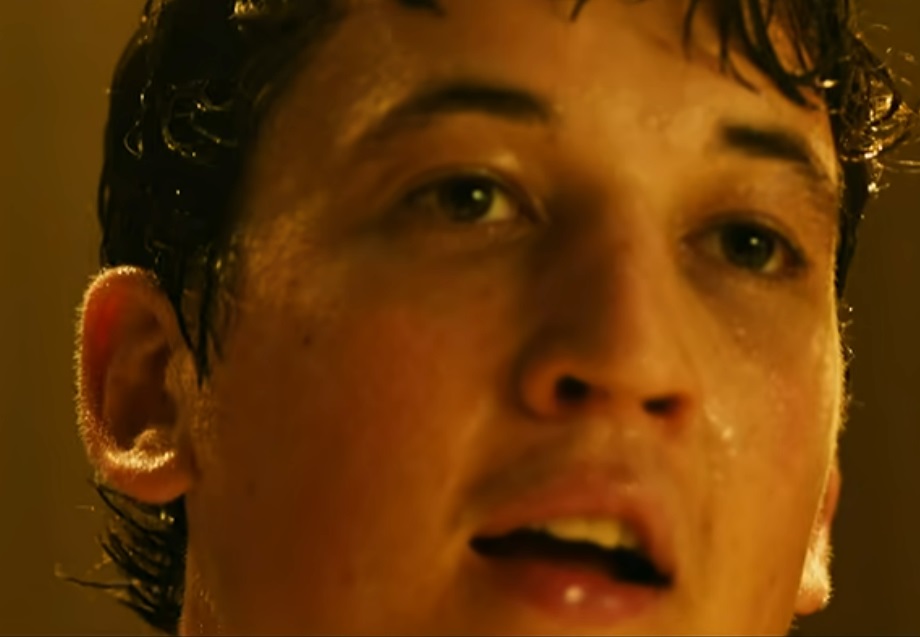
At the same time, Fletcher smiles. He too has received exactly what he wants–the end of Andrew Nehman–but his victory is a Pyrrhic one. His career as a conductor, never mind a tastemaker in the New York music scene, is effectively finished. He will be forever remembered as the man who failed in his capacity as a band director, letting down the young musicians who trusted him when it mattered most, and whose former protege keeled over dead on stage in front of hundreds of the most important people in the jazz world. That he doesn’t realize this is a testament to his blinkered view of music and utter inability to consider any perspective outside his own.
Because of this, Whiplash’s ending manages to be both horribly sad and deeply satisfying and triumphant. With his death, Nehman sets himself free once and for all from both Fletcher and the drums that held him captive for so long, while exhibiting, in the words of C.S. Lewis, “a kind of gaiety and wholeheartedness” that is “the natural accompaniment of courage.” 16 The review of Whiplash from the Sundance Film Festival elaborates on this when it describes the film as “investing the traditionally polite stages and rehearsal studios of a topnotch conservatory with all the psychological intensity of a battlefield or a sports arena[emphasis added].” 17 In this last scene, Nehman is a warrior who sacrifices his life in order to bring down his enemy, and he does so not to benefit himself–since he will never live to see the aftermath–but all aspiring New York jazz musicians who come after him.
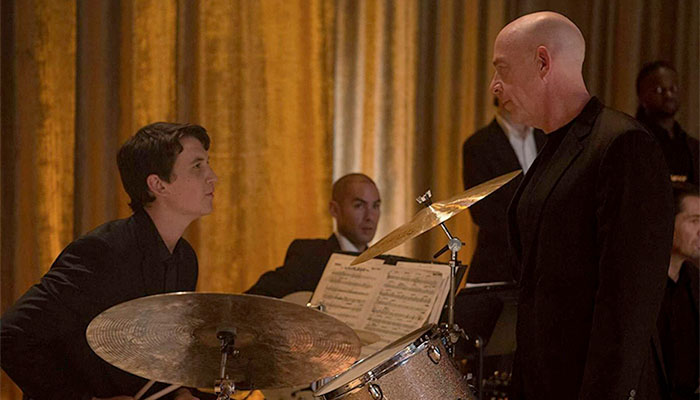
In a roundabout way, this also makes Nehman the equal of his late mother. After all, childbirth has long been considered the female equivalent of going to war. 18 The Aztecs in particular believed that mothers who died giving birth would gain admittance into heaven alongside the brave warriors, where they would have the privilege of waiting on the sun god himself. 19 By dying what amounts to a warrior’s death, albeit on a non-traditional battlefield, Nehman justifies his entire life, and proves that his mother’s death was not in vain. Rather, she sacrificed herself in order to bring forth the man who would one day free the music world from the malign influence of Terence Fletcher. Under these circumstances, it is no wonder that Nehman goes out with a smile.
Despite its manly swagger, Whiplash, Damian Chazelle’s directorial debut, is a deceptively subtle, complex, and layered film. This ostensibly simple story about a young drummer and his artistic mentor poses deep, probing questions about the nature of not only creativity but strength, courage, and what being a man really means. Whiplash asks what type of person would be most drawn to the high-pressure life of a professional performer, and what might motivate this person to stick with it even when the going gets tough. The answer is, evidently, that greatness comes most readily to those who are already used to the struggle, because they have been fighting for their right to exist from their very earliest moments.
Works Cited
- “Whiplash vs. Black Swan — The Anatomy of the Obsessed Artist.” YouTube, uploaded by Lessons from the Screenplay, 22 Nov. 2016, https://www.youtube.com/watch?v=ba-CB6wVuvQ ↩
- Allison, Austin. “‘Whiplash’ Is Actually a Horror Movie in One Major Way.” Collider, 10 Nov. 2023, https://collider.com/whiplash-horror-movie/ ↩
- Debruge, Peter. “Sundance Film Review: Whiplash.” Variety, 17 Jan. 2014, https://variety.com/2014/film/reviews/sundance-film-review-whiplash-1201061948/ ↩
- U/f_n_wildcard. Is “Whiplash” just the guy’s version of “The Devil Wears Prada?” Reddit, 21 Dec. 2022, https://www.reddit.com/r/movies/comments/zrc3iu/is_whiplash_just_the_guys_version_of_the_devil/ ↩
- “Miles Teller on How a Car Accident that Nearly Killed Him Changed his Life.” ABC News, 19 Aug. 2016, https://abcnews.go.com/Entertainment/miles-teller-car-accident-killed-changed-life/story?id=41494310 ↩
- “German-English translation for “niemand.” Langenscheidt online dictionaries, 2024, Langenscheidt, https://en.langenscheidt.com/german-english/niemand ↩
- Powell, Kimberly. “Neumann Surname Meaning and Family History.” ThoughtCo, 11 Jul. 2019, https://www.thoughtco.com/neumann-surname-meaning-and-origin-4083900 ↩
- Baby Names Content Team. “Andrew.” The Bump, 5 Apr. 2024, https://www.thebump.com/b/andrew-baby-name ↩
- Bagg, Emily. “Terence.” The Bump, 30 Nov. 2023, https://www.thebump.com/b/terence-baby-name ↩
- “Top 10 Benefits of Learning Drums for Adults and Children.” Chinook School of Music, 1 Jan 2023, https://www.chinookschoolofmusic.com/whatsnewcsm/thebenefitsofdrumlessons ↩
- “How Childhood Trauma Leads to Addiction – Gabor Mate.” YouTube, uploaded by After Skool, 19 Jan. 2021, https://www.youtube.com/watch?v=BVg2bfqblGI. Accessed 14 Apr. 2024 ↩
- Verrier, Nancy Newton. The Primal Wound. Baltimore MD, Gateway Press, 1993 ↩
- KirstenCorley. “What You Learn Loving Someone Who Grew Up Without a Mother.” Mogul, 2015, https://onmogul.com/stories/what-you-learn-loving-someone-who-grew-up-without-a-mother ↩
- lonewolf3. “birth mother died while giving birth to me…how to cope?” Adoption.com, https://adoption.com/forums/thread/322350/birth-mother-died-while-giving-birth-to-me-how-to-cope/. Accessed 14 Apr. 2024 ↩
- STL Rock School. “Unlocking the power of drums in rock music through drum lessons.” STL Rock School, 19 Sep. 2020, https://www.stlrockschool.com/rock-music-through-drum-lessons/ ↩
- Lewis, Clive Staples. “Forgiveness.” Mere Christianity, C.S. Lewis Pte. Ltd., 1952, pp. 119 ↩
- Debruge, 2014 ↩
- Farrelly, Elizabeth. “Childbirth is why women don’t go to war.” The Sydney Morning Herald, 12 Jan. 2018, https://www.smh.com.au/opinion/childbirth-is-why-women-dont-go-to-war-20180111-h0h28e.html ↩
- Chavez, Sarah. “Motherhood on the Battlefield of Death.” The Order of the Good Death, 13 May 2018, https://www.orderofthegooddeath.com/article/motherhood-on-the-battlefield-of-death/ ↩
What do you think? Leave a comment.











The actual villain is the kid. Fletcher has a modality that shuts off when he’s not on stage, and this is made clear multiple times. Fletcher knows what he’s done and believes in his work. It’s for the world. The kid is in it for himself, and can’t shut it off. He’s a prick to his family, his cousins, his father, Fletcher, and his peers. This is shown CLEARLY. The purpose of Fletcher’s breaks from his performance-adjacent expectations is to show his maturity and poise IN this modality. The “protagonist” is single-minded and will sacrifice ALL human connection for what he wants; Fletcher actually has friends in the world, ALSO shown in the film.
Whiplash is about a sad little man who liked drumming but wanted to be so perfect that he never took a break. No it was about trying to impress a woman that thought she was so perfect that she never took a break.
I think pushing humanity toward greater by being great is a task for a chosen few that comes with Sacrifice. Some people sacrifice their whole life’s and we reap the benefits. When they built the pyramids was everyone happy while doing it.
I wish I had music instructors like this when I was in school.
I see it as a bit of a maserpiece, a young guy trying to find himself and gain inner strength. My favorite thing about it is the ending.
The look his father had I read as shock- never expecting it out of his kid. And then it all cuts to black so I interpret my own epilogue, maybe Nicole was in the audince and her BF said something rude, or she was shocked to see Andrew hit Fletcher in the head with the symbols. Maybe she hangs around to find him afterwards. Maybe someone in the crowd saw Andrew and they rush to offer him a place in their band. Possibly the dad sees Andrew talking to Fletcher and rushes over wanting to protect him but he hears Fletcher saying to -‘take care of yourself don’t wanna see something bad happened to a Great’ but no matter what for that moment at the end both Andrew and Fletcher knew he was Great, he was allowed to be great.
My music teacher is a nice guy, but he’s SUPER tough if you’re messing up. At one point, we were singing a canon and one kid started singing a beat too early and he straight up yelled at him to get out and not rejoin the choir that season. Super nice when you’re good, though.
So, who else thinks that Fletcher is the one who took the music folder?
ME!
I always saw the film film as some kind of backwards tragedy about a “justified” abuser and the questions that raises.
Lovely post. I think to me the most insidious part of the whole movie of whiplash is watching the anger melt off fletchers face into wonder and satisfaction. It was at that point you can see in his mind that he has won, and he finally has a case study to prove his methods right. Especially given his personality, the fact that only Andrew ever broke through to greatness isn’t a negative, its proof that only a select few ever achieve greatness, and well, “Only Andrew made it cuz only Andrew was worth making it” He’ll never doubt himself again, and he’ll double, triple, and quadrupole down to push Andrew higher and higher and we can all know where it is. To me, that scene was akin to a horror movies scene where the last final desperate escape from the villain is thwarted, and the screen cuts to black with the audience fully aware that the game is up, and the bad guys won. This scene showed us that after everyones efforts to pull him back, Andrew has fully lost to Fletcher, and thrown himself into drumming, and we can all see how its going to end.
I’ve just seen it, such a cleverly constructed movie, the scenes share the mental anxiety andrew is feeling honestly Simons nailed this performance as the character, the stages of his manipulation all have an endgame and forms a collective goal.
I felt like I was watching the origin story of a rock star before he decided to get into that sort of music.
The irony: nobody knows or gives a damn about any of these hyper niche musicians outside of their tiny sphere. Nobody is going to talk about the drummer in an orchestra at a dinner table.
Speak for yourself.
Nice article! It really made me think!
Whiplash isn’t about drumming. It about rising above a really bad education, in the old “what doesn’t kill me makes me stronger” sense of things, and for artists that can include isolation, insecurity, and a million other possibilities besides.
I love this film. I don’t see why people are taking the film so seriously- we all know it’s over the top, we all know it’s not promoting that we of teaching but rather bringing light to the controversy of it. Some people are taught like this, I had one dance teacher in particular who was terrifying to say the least.
A really good film and an outstanding performance by JK Simmons.
Insightful article. Watched it today and thought it was fantastic. A proper adrenaline rush of a flick with a genuine heart to it.
The meaning of Whiplash is the dire consequence of not knowing one self and not following one’s own heart.
The final performance: feltcher when he realizes he should have became a neuro bass or Break Core producer instead of a jazz band instructor.
Feltcher is upset in the film because he did jazz to be classy. However his true passion is neuro bass, Break Core and smashing things. Instead of channeling his passion for fast paced break beats and heavy sound design into music, he channeled it on real people.
This is the true consequence of not knowing one self and not following one’s own heart.
I actually think you may be onto something. It certainly doesn’t seem like Fletcher cares about jazz music much per se.
To me, the movie was about the dichotomy between the intense anger and violence of Fletcher and the beautiful, carefree-sounding music they produce.
Being the greatest is always what Andrew has wanted, even before fletcher. It is just who he is.
In the ending sequence, it shows more than anything Andrew making the final decision, that no matter what, he is going to be the greatest. When they both smile at each other, it shows how both of them have finally accomplished there goal.
We can see that they both still hate each other towards the end, when Fletcher insults him, and Nieman interrupts Fletcher’s song and hits him with the cymbal, but they are both willing to put up with each other, because they are willing to do whatever it takes.
This movie reminded me of my Master’s Professor who was very abusive to his students. A lot of my peers dropped out but if you survived, you came out as one of the top grad researcher (with a side of PTSD here and there). I was young and dumb thinking I would come out of it without any repercussion. Still have nightmares to this day of those years…
I feel it’s ambiguous. While Fletcher was appalling to Andrew and the other students, he did everything he needed to get Andrew in the frame of mind to achieve greatness. The question is whether the obsessive need to get there is worth the payoff.
When i first watched whiplash i hated the ending, i was so caught up in wanting what was best for andrew that i never considered the meaning, after reading this i have a newfound appreciation for the film.
I think this movie is also a cautionary tale of how your passion can be used against you. Take a look at video game developers and how they have to deal with the abuse they get because they’re working a “dream job” and they accept it because there’s a line of would be developers who would love to take their spot.
Or for example (to keep it in the arts), take a look at professional wrestling. When you start out you may have to go to independent shows and ask the promoter if they need anyone you’re available and many of the would be wrestlers help to assemble the ring, set up chairs, then take down the ring and pick up trash. All for the hopes of getting booked. You don’t get paid for that, but everyone tells you that it’s part of the process and that it shows passion, but none of that matters if the promoter has no intention of ever wanting to book you. They use that to get free labor from people.
It’s a total win for Andrew when his family would never truely appreciate his works.
What I saw in those final moments in the movie was freedom. Everything aligned. He wasn’t worried about anything. He was just letting loose. The familiar scene of blood dripping down his hand, that was his dedication, his passion, his being. In that moment, that was his everything. It was his magnumopus.
Or at least that’s what I felt.
It’s about PRACTICING. Yall need to pick up that instrument and practice. Thats what i do every time i see motivational stuff like this.
My old boss was like Fletcher. Took me years to recover. Weird bc my old boss loved this movie and thought Fletcher was such a great character and was fascinated by him. Spoke as if he was justified in his deplorable behavior.
Great movie, and this is a fantastic analysis.
Andrew might not be totally happy having achieved his dreams, but I think the alternative for him would have been a fate worse than death, settling and wandering his entire life what if he actually went for it. What if he had actually pursued his dreams with everything he had while he still had the energy vigor and drive.
It’s interesting you mention that because part of me wonders if the real purpose of Whiplash was to be a kind of “sour-grapes” fantasy on Chazelle’s part. Particularly with his repeated insistence in interviews that Andrew never never never becomes great, and is destined to die broke and drunk and full of heroin at the age of 34. I have it on good authority that Chazelle based Fletcher on a drumming instructor he had in high school (and absolutely hated), and that this instructor effectively discouraged him from pursuing a full-time career in music. If all “great” musicians are miserable wretches with no personal life who are destined to die much too young, there’s no need to feel bad that you can’t compare.
I interpreted the dads expression in the finale act as him realizing that his son is great, at the dinner table seen they all wrote his profession off thinking it lesser then football but seen is son rise to the occasion he truly sees that he is not his youngest son but probably the greatest son.
That’s exactly what I thought so too, but looking at it from another perspective makes me think that maybe he thought that his son has both become one of the greats and lost a part of his soul to the obsession of achieving greatness.
Just rewatched whiplash. In the very final part, I had always interpreted his dad’s expression as awe and shock in realizing the passion/talent/greatness that his son is finally realizing. It was always my opinion that his family never took his drumming seriously and so this was a defiant moment in proving them wrong.
Fletcher is the personification of evolution, the ultimate sieve with only one goal, which in this case is to emerge an outstanding individual by unleashing the power of genius, unbridled and uncompromising passion – the new Prometheus unbound. To paraphrase Darwin: may the most obsessed prevail; only those who have the courage to look into the heart of darkness are worthy of a true epiphany… Even if the price is a bottomless pit of despair and loneliness. These are words of great Luchino Visconti: “”There is no greater tragedy than seeing a human being destroyed by his own passions”. Despite the clear warning, he and all of us succumb to the spell of heroes on the brink of madness.
It’s a great movie, some really good performances and characters. Interesting subject and accurate devices. I like how they really make it feel like a dance with the devil as he tries to win this guy’s approval.
Is suffering the only path to greatness? Is triumph of will over limitation the only reagent required to produce a great work? Ironically, being so reductive and monomaniacal in our (western) concept of greatness is exactly fleeing from the complexity that makes any work or life story beautiful. I assert that reductive tendency is a key feature of a culture built on militarism.
And the greater irony is that the key to great drumming is not smashing full speed into your instruments. That’s only a great way to induce stress injuries that shorten your drumming career. The recoil is supposed to be used to travel and flow from pad to pad.
It’s a movie about sado-masochism.
I was a jazz drummer at an elite music school in Connecticut. I ended up with a PhD in history instead, but the drive to obsessive excellence is identical in all cases.
Whiplash isn’t a story about glorious success through relentless hard work. It’s about devastating tragedy that comes as a consequence of obsessively going after it. And once you obtain it, you lose what’s actually more important: yourself and everyone and everything else.
I would enjoy seeing a writer compare some of situations in Whiplash to situations in The Bear. Carmie’s relationship with Chef David (Joel McHale) would an interesting compare and contrast to the student and teacher in Whiplash.
Great article!
Whiplash is one of the greatest films of our time. The cost of greatness is everything: your relationships, your social life, your enjoyment of the chosen career, and even your sanity. This drive to becoming the best at something is akin to being a drug addict, as you’ll do whatever it takes to achieve this. The acting, theme, and story are all fantastically executed. Definitely a great watch and a warning to anyone in the pursuit of greatness that, no matter your ambition, it is not worth all of the sacrifices you will inevitably make in the process.
The meaning is to put the audience into the mindset of an abused person. The “greatness” thing is window dressing, and it’s supposed to be something that the abuser character would say to the abused. The whole narrative of achieving big things and sacrificing to become something great is supposed to be something the abuser would say. It’s supposed to make the audience feel like the abused character, by having the movie make us believe things about the main character that the abuser would make the main character believe about himself. The movie is the abuser, and the audience is being made to feel like the abused character.
Simmons’ character is the sort of megalomaniac who is content with absolute control over a small sphere of influence, and utilizes psychological manipulation and torture techniques like gaslighting to claim credit for the hard work and sacrifice of others. Classic middle manager type: unable to achieve greatness, content with torturing others like he tortures himself for failing… until they succeed. Then maybe he can feel like he succeeded with them, even though he never will. Toxic, predatory, and all too real and common in teachers.
I largely agree with you, and I think that’s why I find Whiplash more unsettling the more I rewatch it. Because, particularly when the metacommentary surrounding the film is taken into account (in the form of interviews with Chazelle and even many of the comments on this very article), it kind of seems like it’s trying to push you into the role of Fletcher. Ordinarily, when a character is abused, it’s meant to make the audience support that character; but instead, Nehman is kind of made out to be an idiot for getting taken in by the whole thing, as if the fact he doesn’t know better means he somehow deserves his suffering (i.e., “He’s so obsessed he can’t keep a girlfriend because he’s too busy practicing! What a fool!” etc). The film also has multiple, lingering scenes of Nehman bleeding and suffering, which are ostensibly designed to show his obsessiveness; but the way the narrative keeps circling back to it on camera makes it seem like Chazelle is enjoying his suffering a little too much. And then, after all that, when Nehman finally pulls off a great drum solo, even that is taken away from him by the capital-D Discourse, which states that it only proves how slavishly devoted to Fletcher he is. It’s enough to make me almost prefer the naysayers who believe Whiplash is a horrible, disgusting film that glorifies abuse, even though I actually like the film.
One of the best lowkey thrillers I’ve ever watched. Brilliant film making here.
This movie gave me more anxiety than most horror movies I constantly was worried about fletcher flipping out at Andrew I constantly got worried he’d mess up bc I knew what was coming
As a lifelong musician, I see this movie as being just about as truthful as it can be. In order to achieve greatness, you have to be willing to sacrifice absolutely everything. You can’t allow anything to hold you back. Some of the musicians I have looked up to over the years even chose homelessness if it meant it could put them in the right spot to snag the one job that could potentially take them to the top. That total personal sacrifice is what is necessary. Things either serve your ultimate goal or they need to be dropped from your life completely. This is the level of sacrifice I was never able to choose. Was I smarter about my life choices because they kept me safe and comfortable? Not always. Certainly not when weighed against the vision of what my life could be if I chose to abandon all else but my desire for music. So, yes, this movie indeed does have a happy ending.
This is a great analysis, amazing work!
This reminds me of varsity, studying graphic design. Eventually things got to that point with students coz we wanted to pursue perfection. Or at least make it.
Whiplash is fuel for people who want to be the absolute best. Probably why I love this movie so much. I am a drummer myself, and all I want is to be better than anything. When I watched this movie for the first time, I was tranced and amazed by the cinematic elements of the movie. I was in love with the idea of success in grief. I still continue to consider this movie as my inspiration, which may be too much. But honestly, it gave me such a great outlook on how some people can really be pushed and shoved into a corner. Which they never leave, because it’s a secluded space of isolation. To stay in a place such as that, they have no where else to go.
Fletcher is particularly disgusted. He is so vile about making the best in stead of becoming the best himself. He’s taking his self loathing out on others. He knows he doesn’t have what it takes so he’s crushing others, proving nobody else has what it takes either. Even if he did find the next Charlie Parker, he’d be sure to destroy them. He’s a sick man.
This film is about male ego.
Whiplash is about how i need to work harder.
What a great dissection of the movie. Thank you for sharing your thoughts!
Reminds me of my journey through special operations.
This whole movie felt like bootcamp. I’m sure a lot of service members could relate to Andrew. All that abuse and all you have to do to make it stop is not listen to the guy telling you what to do, but you do it anyway bc you want to be apart of something and see your full potential.
My son and I watched this together (he is a musician), and I made sure to make him understand the Charlie Parker died a heroin addict/alcoholic at age 35.
The movie was unrealistic. The story of obsession in an artistic pursuit doesn’t need the inclusion of a narcissistic character.
There are always groomers in the entertainment industry. Fletcher is just grooming Andrew like many young entertainers are groomed by adults wanting to bank off their talent.
Whiplash is about external, abusive demands impeding upon authentic forms of creative self-expression. Real artistic achievement and expression cannot arise naturally underneath the pressures of narcissistic abuse and capitalistic obsession with proving individual worth. Real art thrives within supportive communities when artists are given space to find and navigate their own voice and inspiration without extreme externally imposed demands. I think the militaristic abusive conditioning we see in Whiplash is extremely relevant everywhere and extends far beyond the arts, and into every aspect of our work culture.
I like the “What’s in a name” part – it’s quite informative. I also like how you tied the explanation of the characters names to the theme of movie. Great article